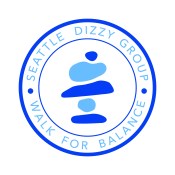
Strategies for Improving Communication with Hearing Loss & Tips for Managing Tinnitus
by Mary Henry, AuD
of Swedish Balance Center
(Presented to Seattle Dizzy Group on 11/4/17)
This presentation discusses hearing loss/impairment and offers strategies for improving communication with others as well as tips for managing tinnitus.

The majority of people with hearing loss have loss in the high pitches of speech (“f, s, th, k”), which tends to cut out the clarity of speech. This is why a common complaint for a person with hearing loss is “I can hear fine – people speak loudly enough, but they mumble!” However there are many different configurations of hearing loss, particularly for those who experience balance problems.
If you have ever had a hearing test (or plan to have one), feel free to draw your right (O) and left (X) hearing scores on this graph and see which letters you might be missing! The letters you have difficulty hearing are the ones which fall above your scores (as they are softer than the softest sound you can hear). Talk with your audiologist if you have questions about this.
Communication Strategies for the Individual
Advocate for Your Listening Needs
Hearing loss is “invisible.” This means it is difficult for others to determine when you are having difficulty hearing. Acknowledging your hearing loss and educating others about your listening needs will facilitate successful communication. Many are unaware of strategies that can improve communication. Education and gentle reminders to use strategies are helpful to improve communication.
Strategies to Share for Improving Communication
- “Please get my attention before speaking to me. It is helpful if you say my name or tap me on the shoulder to ensure you have my attention before beginning to speak.”
- “Please look at me when speaking. I benefit from seeing your mouth for speechreading cues.”
- “Please speak slowly and clearly. It is difficult for me to hear some speech sounds when speech is spoken quickly.”
- “Please reduce the background noise. I will hear you better if the television/radio/dishwasher/fan is turned off.”
- “Please don’t cover your mouth while speaking to me. I benefit from seeing your mouth for speechreading cues.”
- If you only hear part of a sentence, repeat the part of speech that you did hear, for the other person to fill it the part you missed. (“You want to go to the movies when?”)
- “Please let me know if the topic of conversation changes. Please give me a clue such as: Movie. What movie would you like to see?”
- “May I sit at the center of the table? Sitting in the center allows me to clearly see everyone, which will provide me with visual cues about the conversation.”
- “May I sit with the noise to my back? It will help my hearing aids reduce those sounds” (if you wear hearing aids with directional microphones).
Communication Strategies for Friends and Family
Hearing loss is “invisible.” The nature of hearing loss makes it difficult for communication partners to realize when a communication breakdown has occurred. People with normal hearing may be unaware of the additional concentration those living with hearing loss exert to communicate. As a communication partner to someone with hearing loss, you can take the following steps to facilitate communication and understanding:
- Always speak from within the same room.
- A person with hearing loss will not hear your message when you speak from one room into another.
- Face the listener when speaking.
- The listener with hearing loss utilizes visual cues in addition to hearing. Clearly seeing the mouth is essential.
- Do not cover your mouth with your hand or an object as this muffles your speech and removes visual cues
- Take advantage of well-lit areas to increase facial visibility.
- Get the listener’s attention before speaking.
- Tap the listener on the shoulder before talking, if mutually agreeable by both individuals.
- Say the listener’s name before talking. This simple step focuses the listener’s attention and a head turn provides acknowledgement to the speaker that the listener is prepared for conversation.
- Reduce background noise when conversing.
- Turn off the television, radio or noisy equipment when possible.
- Select quiet establishments or dine during off-peak hours when visiting restaurants.
- Conversations in the car may be challenging. Assistive devices may be helpful in reducing these challenges. Talk to your audiologist to determine if these are appropriate.
- Visit in smaller groups when possible.
- Many hard of hearing people have difficulty following and participating in rapid conversations between many speakers. Reducing group size to a smaller group of three or four versus a larger group of eight or more speakers can result in easier participation.
- Cue the listener with hearing loss when the topic of conversation changes.
- Speak slowly and clearly.
- Rapid speech is often difficult to understand for those with hearing loss. But don’t slow down too much — that can also reduce understanding!
- Enunciate clearly.
- Do not shout.
- While speaking loudly and clearly are appreciated, shouting is not necessary.
- Shouting distorts facial features and may hinder lip reading cues.
Tinnitus
What is tinnitus? Tinnitus (pronounced TIN-it-us or tin-NIGHT-us) is the perception of a sound or noise in the ear or head that occurs in the absence of a sound. Some people perceive tinnitus as a ringing sound while others report it as a clicking, roaring, hissing or static noise. It is also common for tinnitus to become louder and change in severity from time to time. The exact cause of tinnitus is unknown, however it is often associated with hearing loss and is sometimes a symptom of it. It should be noted that tinnitus can occur independently of hearing loss, and sometimes people with normal hearing will also experience it.
What causes tinnitus? The exact physiological causes of tinnitus are not known. It may be associated with many factors, including the following:
- Noise exposure
- Cerumen (ear wax) impaction
- Side effects of medications (particularly anti-inflammatory medications and medications in the aspirin family
- Fatigue
- Stress
- Vascular abnormalities
- Ear conditions, including hearing loss, Meniere’s Disease and ear infections
- Ear, head and neck traumas and jaw misalignment
- Other possible factors that are less conclusive include alcohol, caffeine and smoking
- Other unknown factors
Can it be cured? Though it is the subject of extensive research, there is currently no known cure for tinnitus. The nature of tinnitus is unpredictable. For some it may spontaneously resolve over time. Others learn to live with tinnitus as a chronic condition. Coping strategies are recommended to manage tinnitus symptoms.
What can I do to manage my tinnitus? Different strategies work for different people. Below are some suggestions:
- Remain positive. It can be easy to become discouraged by limited tinnitus treatment options. Tinnitus is an area of extensive research. We may have insights and answers tomorrow that are not available today.
- Redirect your attention. Many report that focusing on the tinnitus can exacerbate the symptoms. Pursuing a hobby or favorite activity can be an effective refocusing tool. Many report that they are unaware of the tinnitus when reading an interesting story, watching a favorite television program or having a conversation with others.
- Explore masking noises. Tinnitus is often most noticeable when trying to fall asleep or early in the morning. Some find that the use of noise machines or a radio playing at a low level mask the noise of tinnitus while falling asleep.
- Wear hearing aids if appropriate for your hearing. Many report that tinnitus is less noticeable when hearing aids are worn. Hearing aids do not cure or prevent tinnitus. The increased volume provided by hearing aids can sometimes mask tinnitus sounds.
- Avoid loud noises. Always wear hearing protection when operating machinery and lawn equipment and when attending concerts or playing an instrument.
- Reduce stress. Many report that tinnitus is more prominent during periods of stress. Consider breathing exercises, yoga or taking a walk to reduce stress.
- Rest. Get adequate sleep at night. Fatigue has been associated with increased tinnitus.
Where can I find other tinnitus resources? Tinnitus information, management strategies and support groups can be found through the following sources:
American Tinnitus Association: www.ata.org
American Academy of Audiology: http://www.howsyourhearing.org/tinnitus.html
American Speech-Language and Hearing Association: http://www.asha.org/public/hearing/tinnitus/
Mayo Clinic: http://www.mayoclinic.com/health/tinnitus/DS00365
TM Soft: Downloadable white noise maskers: http://www.tmsoft.com/iphone-whitenoise.html
Mary Henry, AuD
of Swedish Balance Center
More information about Mary Henry:
*******
Presentation information is not meant to be taken as medical advice.
Presentations posted online may include discussion notes, links, images, and other information added by Seattle Dizzy Group.
*******
© Copyright 2017, Seattle Dizzy Group. All rights reserved.








[…] In 2017, we had guest speakers on the topics of “Decreasing Fatigue Naturally” and “Tinnitus” as well as “Exercise & Tai Chi Moving for Better Balance” and also “Hearing Loss/Impairment.” […]
By: Help Make a Difference in 2018 | Seattle Dizzy Group on January 31, 2018
at 11:51 pm
[…] Managing Hearing Loss & Tinnitus […]
By: Communicating with Hearing Loss | Seattle Dizzy Group on December 31, 2019
at 4:30 pm